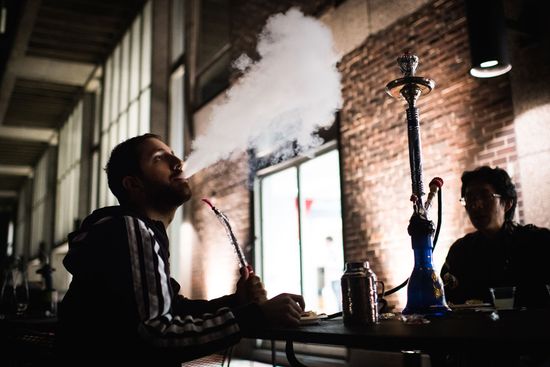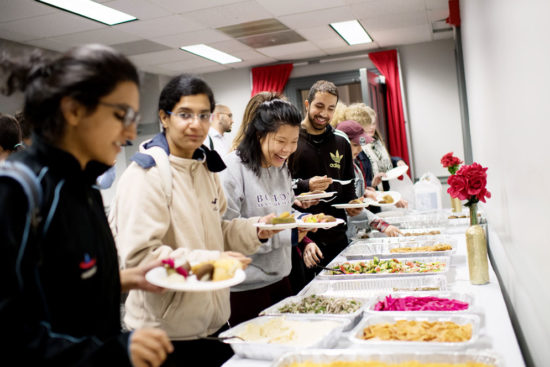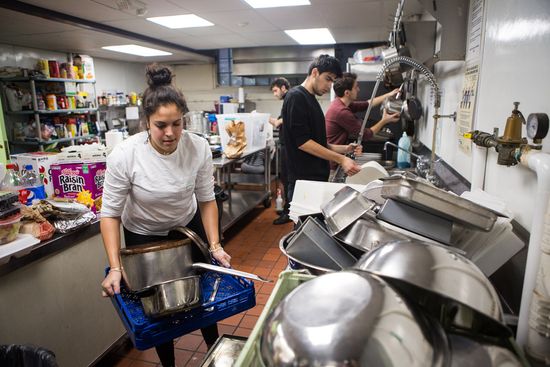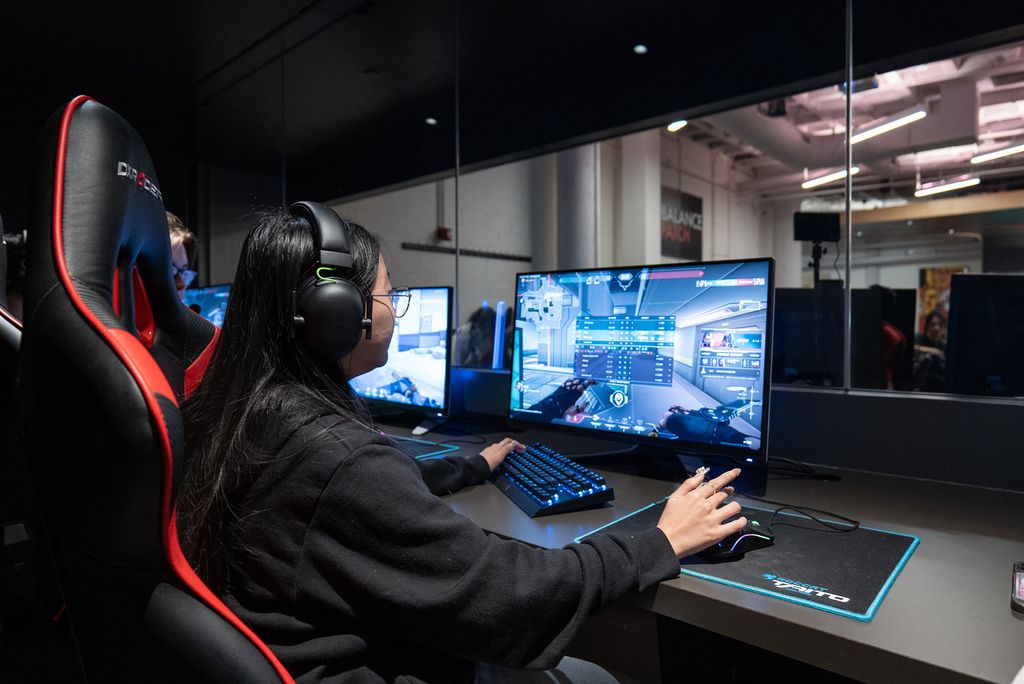Lebanese Club Promotes Culture and Service
Annual gala Saturday: music, dance, and food, lots of food

Members of the Boston University Lebanese Club have worked hard to make the club’s annual gala a rousing success. Lebanese Night is tomorrow, February 10, in the GSU’s Metcalf Ballroom. Photo by Jake Belcher
When guests walk into the GSU’s Metcalf Ballroom tomorrow night, it will be into a Middle Eastern restaurant and club, courtesy of BU’s Lebanese Club members, who have been working all week to transform the space.
It takes months of planning to pull off the club’s annual Lebanese Night gala, an evening of music, performances, and food, lots of food. More than 500 stuffed grape leaves, 200 pounds of hummus and baba ghanoush, and tray after tray of spinach pie will be served, even before the main course comes out.
“It’s a phenomenal event, our main attraction,” says club president Tarik Zahr (CAS’18). “And it’s all student-run.”
The event is the club’s biggest of the year, and it’s expected to draw up to 500 people, many of them nonstudent guests from across Massachusetts, this year.
Part of the club’s mission is to share Lebanese culture—food, music, dance—with BU students of all nationalities, as well as with the greater Boston community. But the gala is also a way for Lebanese students to come together to celebrate their shared heritage.
This year’s gala will feature performances by Celia the Belly Dancer, singer George Maalouf, and the Boston Dabke Troupe, demonstrating Arab folk dances.
And because food is central to Lebanese heritage, there will be plenty of authentic Lebanese cuisine. Club members plan to share the stories behind each classic dish to help educate guests about Lebanese culture and values. The evening will also include a photo booth and souvenirs.

“It’s always a good time,” says member Joe Baini (Questrom’20), who visits his extended family in Lebanon every summer. “It’s a bigger community than people think.”
Lebanon may be a tiny nation, about the same size as Massachusetts, but because of years of political conflict and civil war, the Lebanese diaspora is huge. The number of Lebanese living in South America, the Caribbean, and the United States now outnumbers the population of their home country.
The club is one of the BU’s largest, with hundreds of general members and a core group of about 30 active members. Being Lebanese is not a requirement for joining, although most members are. The club is also religiously diverse, much like Lebanon itself, drawing Christian, Muslim, Jewish, and Druze students, as well as those of other religions.
But club leaders stress that the group is nonreligious and nonpolitical.

Members generally speak English, not Arabic, at their monthly meetings, although the executive board is fluent in both. Zahr says club meetings and events also give freshmen and sophomores a chance to connect with upperclassmen, who can share insights about classes, academics, or job opportunities.
What bonds the group is a sense of shared cultural identity.
“There’s a lot of deep-rooted conflict in Lebanon, and we try as much as possible to put that aside and just focus on the people and experiences,” says club secretary Tania Kombarji (Questrom’18). “We just try to have fun.”
Kombarji, who attended an American preparatory school in Lebanon, says she joined the club as a freshman “to get that little piece of home that the people in the club represent.”
In addition to Lebanese Night, the group’s other annual high-profile event is Hookah Night, a fun-filled evening of food, games, and as its name suggests, a chance to smoke fruit-flavored tobacco.
This year, as the club celebrates its 15th anniversary, members tried something new: a community service project. Late last semester, approximately 20 club members spent a Saturday cleaning the Harvard Square Homeless Shelter and serving food to its clients.

Zahr, who came to the United States in 2014 to study premed at BU, thought the project would be a way to show members “the beauty and humanness of giving and serving at no cost,” he says.
“As students of relative socioeconomic privilege having the opportunity to study at a private institution such as BU, we have all the resources to give back to those in need,” Zahr says. “So why not?”
Broadening the club’s mission to include public service also aligns with his interests. He hopes to pursue a career in medicine or public health that could help to solve problems related to health-care disparities.
“Our main goal has always been to share and encourage people to learn more about Lebanese culture at BU,” says Zahr. “Our new goal is to dig deeper. We’re trying to do meaningful things.”
For more information about the Lebanese Club, email Zahr at tzahr@bu.edu.
Lebanese Night 2018 is tomorrow, Saturday, February 10, from 8:30 pm to midnight in the George Sherman Union Metcalf Ballroom, 775 Commonwealth Ave. Admission is $5 for BU students and $25 general admission. For more information visit the BU Lebanese Club Facebook page.
Megan Woolhouse can be reached at megwj@bu.edu.
This Series
Also in
BU Clubs
-
October 27, 2023
Video: Skateboarding with BU Girls Skate
-
May 3, 2022
Promoting the Beauty of Natural Hair
-
April 27, 2022
Yes, BU Has an Equestrian Team. And It Just Had a Record Season

Comments & Discussion
Boston University moderates comments to facilitate an informed, substantive, civil conversation. Abusive, profane, self-promotional, misleading, incoherent or off-topic comments will be rejected. Moderators are staffed during regular business hours (EST) and can only accept comments written in English. Statistics or facts must include a citation or a link to the citation.